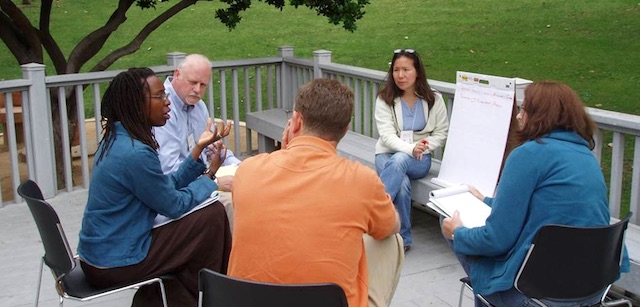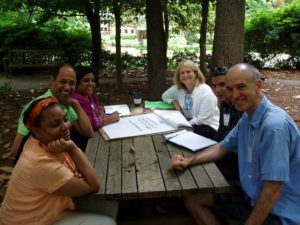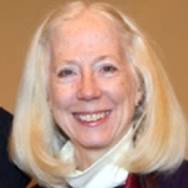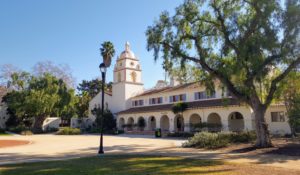
- This event has passed.
Sustainability Across the Curriculum Leadership Workshop
May 24, 2018 - May 25, 2018
$450Is your institution ready to expand curriculum with sustainability? Campus leaders from across the country have found AASHE’s “Sustainability across the Curriculum” Leadership Workshops – based on the Piedmont/Ponderosa model – to be very helpful to guide curriculum development.

Through an intensive two days of presentations, exercises, discussions, reflection, and planning, participants will become familiar with the philosophy of change in higher education developed through the Ponderosa Project at Northern Arizona University and adapted at Emory in Piedmont Project. Readings and organizational materials are provided.
Participants will:
- experience a range of workshop strategies,
- hear local experts,
- enjoy outdoor place-based activities,
- dialogue with faculty from around the country
- adapt the Piedmont/Ponderosa model to their own campuses
- reflect on their own roles in the transformation of higher education.
The application period is now closed. If you applied, you should notified of your status soon.
Fees
- $450/AASHE members | $550/non-members
- Includes snacks and lunches, handouts, materials, and an evening reception.

Here’s what past attendees are saying
- Keep it up! Maybe advertise wider. It was just by chance I saw this and it is the most useful workshop I have been to in a long time!
- Awesome combo of lecture, small group and physical activity. I’ve never felt so positive leaving a workshop.
- Excellent!! Well worth my time. Thank you.
- The workshop provided all that I expected to get and a chance to talk with so many interesting folks about ideas and programs.
- The organization of the workshop was fantastic.
About the Facilitators
The workshop will be led by Peggy Barlett of Emory University and Geoff Chase who is the Provost at California State University Channel Islands. Together, Peggy and Geoff co-edited Sustainability in Higher Education: Stories and Strategies for Transformation (MIT 2013) and Sustainability on Campus: Stories and Strategies for Change (2004). Peggy and Geoff have also led AASHE workshops over ten years, helping more than 500 faculty around the country take steps toward curriculum innovation in their universities and colleges.
Dr. Peggy Barlett, Goodrich C. White Professor of Anthropology at Emory University, is a specialist in agricultural anthropology and sustainability in higher  education. A leader in bringing Emory to its current commitment to a sustainable future, her work has focused in recent years on faculty development, curriculum, sustainable food, and culture change. She has written on the challenges of transforming higher education in recent articles in Current Anthropology, American Anthropologist, and Liberal Education.
education. A leader in bringing Emory to its current commitment to a sustainable future, her work has focused in recent years on faculty development, curriculum, sustainable food, and culture change. She has written on the challenges of transforming higher education in recent articles in Current Anthropology, American Anthropologist, and Liberal Education.
Dr. Peggy Barlett, Goodrich C. White Professor of Anthropology at Emory University, is a specialist in agricultural anthropology and sustainability in higher education. A leader in bringing Emory to its current commitment to a sustainable future, her work has focused in recent years on faculty development, curriculum, sustainable food, and culture change. She has written on the challenges of transforming higher education in recent articles in Current Anthropology, American Anthropologist, and Liberal Education.
Professor Barlett is author of two studies of farming communities and brings her expertise on agricultural systems to her work at Emory. Past president of the Society for Economic Anthropology, she has also served on the Board on Agriculture and Natural Resources of the National Research Council. She received the inaugural Faculty Leadership Award from AASHE in 2011.
Dr. Geoffrey Chase was appointed Provost at CSU Channel Islands in March 2017. Previously, he was the Dean of Undergraduate Studies and the Director of the Center for Regional Sustainability at San Diego State University from 2002-2016, and most recently was Vice President of the WASC Senior College and University Commission (WSCUC). Dr. Chase attended Ohio Wesleyan University, where he received the BA in English in 1971. He also holds an MAT from Miami University (Ohio) and the AM in English from Boston College. After receiving his PhD in American literature from the University of Wisconsin-Madison in 1981, he taught for 11 years in the School of Interdisciplinary Studies at Miami University of Ohio. While at Miami, he served as a Fulbright Scholar in Turku, Finland (1990-1991).
from 2002-2016, and most recently was Vice President of the WASC Senior College and University Commission (WSCUC). Dr. Chase attended Ohio Wesleyan University, where he received the BA in English in 1971. He also holds an MAT from Miami University (Ohio) and the AM in English from Boston College. After receiving his PhD in American literature from the University of Wisconsin-Madison in 1981, he taught for 11 years in the School of Interdisciplinary Studies at Miami University of Ohio. While at Miami, he served as a Fulbright Scholar in Turku, Finland (1990-1991).
At San Diego State University, Dr. Chase played key roles in establishing the Weber University Honors College, the Center for Regional Sustainability, and developed and oversaw programs-undergraduate research, assessment of student learning, academic scholarships, community-based service learning, and faculty development aimed at increasing student completion, success, and achievement. During his tenure at San Diego State, the university posted the largest gains in graduation rates of any research institution in the United States, increased its diversity and erased the achievement gap for six-year graduation rates. Dr. Chase lectures widely on improving graduation rates, sustainability in higher education and he offers workshops on institutional change, leadership, and sustainability.
Location – California State University, Channel Islands, Camarillo, CA.
While our name suggests we’re surrounded by water, relax. You won’t need a ferry to get here.  Camarillo is midway between Santa Barbara and Los Angeles and just 25 miles from Malibu. CSUCI is nestled against the foothills of the Santa Monica Mountains—and close to the Pacific Ocean and the Pacific Coast Highway.
Camarillo is midway between Santa Barbara and Los Angeles and just 25 miles from Malibu. CSUCI is nestled against the foothills of the Santa Monica Mountains—and close to the Pacific Ocean and the Pacific Coast Highway.
Workshop attendees may consider staying an additional day to take advantage of Cal State Channel Islands’ proximity the Channel Islands National Park. The University has a research station located on Santa Rosa Island. The island contains significant natural and cultural resources , which include threatened and endangered plants and animals, fragile and irreplaceable archaeological resources (including burials), and important geological and paleontological specimens.
Questions?
Please contact Geoff Chase at geoff.chase@csuci.edu